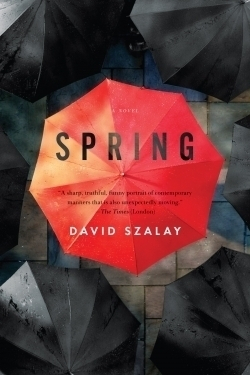Spring
At the heart of David Szalay’s exquisite yet maddening novel Spring is a love story. What’s exquisite is the writing. What’s maddening is its inconclusiveness. The author was listed in 2010 as one of the twenty best British novelists under forty. And it’s easy to see why. His powers of description are terrific. There are great character sketches (“Freddy is piquey and jaundiced … His hair looks like it has slipped off his head …where it trails like the fringe of a filthy rug over his collar”) and great images (a chandelier in a hotel lobby is “an inverted wedding cake, listlessly iridescent”).
There are also passages of lyrical beauty that set the tone of the story: “The very springiness of the still air seems sad to him. Perhaps it is just the way the warming air, on these early spring days, is so sharp with transience. The end of something, the start of something new. Time. It is intrinsically sad.”
So, unfortunately, are the characters. James and Katherine drift around like “half-abstract beings,” vaguely uneasy about how things stand, neither willing to do much about it, neither knowing what they want. “He doesn’t understand her. No more than she understands him.”
It turns out that he is a “man unable to feel his feelings.” And she is the kind of person who succumbs to “the pressure of pretending.” She isn’t sure whether to encourage their relationship or end it, given the fact she’s technically still married. Her husband, Frazer, a paparazzi photographer she’d met at a hotel stake-out for a shot of a famous American rock star staying in London, left a year before James and Katherine met.
What haunts this story is an image shared early on of a baby bird, fallen from its nest, being brought worms by its parent, who doesn’t seem to realize, or can’t accept, that it’s dead. There is something equally pitiful in the sight of a love affair that is over and the characters pointlessly trying to keep it alive by feeding it bits of hope and passion.
Reviewed by
Trina Carter
Disclosure: This article is not an endorsement, but a review. The publisher of this book provided free copies of the book to have their book reviewed by a professional reviewer. No fee was paid by the publisher for this review. Foreword Reviews only recommends books that we love. Foreword Magazine, Inc. is disclosing this in accordance with the Federal Trade Commission’s 16 CFR, Part 255.

